Do you spend sleepless nights? Are you insomniac? If so, you are more likely to develop cardiovascular disease or have a heart attack or stroke, according to new research published Wednesday in the American Academy of Neurology journal.
Researchers enquired about the three key symptoms of insomnia to more than half-million Chinese, such as trouble falling and staying asleep, waking up early in the morning and then struggling to sleep, and trouble focusing on work due to lack of sleep.
A decade later, the researchers examined the participants’ cardiovascular health and discovered that those who had all of the three symptoms of insomnia were 22 percent more likely to suffer from coronary artery disease (CAD) and 10 percent more likely to have a stroke than participants those who slept well and had no symptoms of insomnia.
The researchers also took the confounding factors of heart disease, such as smoking, physical activity level and alcohol use, into consideration.
Study author Dr. Liming Li from Peking University in Beijing said, “The link between insomnia symptoms and these diseases was even stronger in younger adults and people who did not have high blood pressure at the start of the study.”
“So future research should look especially at early detection and interventions aimed at these groups,” added Dr. Li.
However, science is not sure about the exact connection.
Previous studies have shown that lack of sleep or poor quality of sleep could increase the risk of hormone imbalance, inflammatory processes, and metabolic changes.
Neurologist Dr. Natalia Rost from Massachusetts General Hospital in Boston, who was not part of the study, said, “While we don’t understand the exact link, what we’ve learned over the years is that sleep is important.”
“I always think that there are probably more facets to the story than just one link,” she continued. “Maybe it’s the repair of vessels that we hear more and more about during sleep.” “I also think insomnia may be a symptom of some other disease in the body that’s not symptomatic yet,” added. Dr. Rost. “Maybe something is already brewing in the body that insomnia impacts and ultimately manifest 10 years down the road. Hopefully, more research will figure the association out.”























